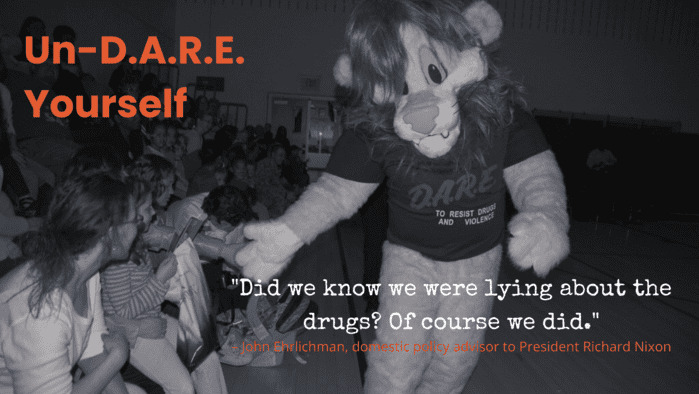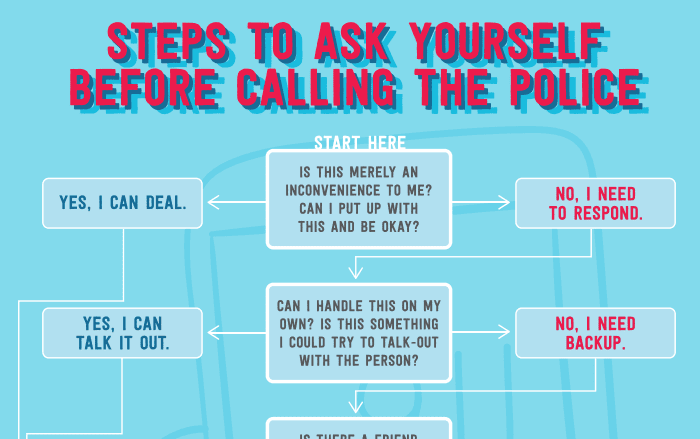
Shift Norms
Underwhelmed by “take action” buttons that just want you to sign a petition, donate money, or share on social media? Those are good things to do, and surely you could do something more.
Overwhelmed by how big the drug war is? Not sure what you can do?
Ember has waded through 251 resources and identified meaningful things you can do in your everyday life to spark change.
Reflect & unlearn
“Drugs are bad. Just say no.” Most of us have a lot to unlearn when it comes to drugs. We were lied to. For decades, politicians and media have used scare tactics and racist stereotypes to sell the War on Drugs; anyone in the US 20-50 years old was likely exposed to D.A.R.E. copaganda.
It’s hard to change beliefs we don’t realize we have. Consider:
Your experience
- What comes to mind when we talk about “drugs?”
- What is your personal experience with drugs? What have you observed with others? Why do people use drugs?
- What did you learn about drugs growing up? How and from whom did you learn?
- How hard do you think it is to quit using drugs?
- What do you think should happen to someone who uses illegal drugs?
- What is your experience of being punished? How did that help or harm you?
Your views of others
- What does a drug dealer look like? A drug user?
- How do race and social class show up in your images of people who use or sell drugs?
- Do you trust someone with a criminal record? In what ways? What hesitations do you have about living next to a person with a criminal record?
Your views on policy
- Does punishment help people stop abusing drugs?
- What should happen when parents of young children use drugs?
- How does racism show up in drug war propaganda and policies?
- How do we prevent and reduce harm from drug abuse?
Intrigued but not sure how this affects you personally?
Knowing one’s self-interest can be the difference between staying home and attending a weekly organizing meeting. Interrogating self-interest allows us to identify what’s at stake for ourselves, even when we are not the most directly impacted. What is your self-interest?
Charlene A. Carruthers from Unapologetic
Identify your “skin in the game” by reflecting on Carruthers’ questions: Who am I? Who are my people? What do we want? What are we building? Are we ready to win?

Learn
The Nixon campaign in 1968, and the Nixon White House after that, had two enemies: the antiwar left and black people. You understand what I’m saying? We knew we couldn’t make it illegal to be either against the war or black, but by getting the public to associate the hippies with marijuana and blacks with heroin, and then criminalizing both heavily, we could disrupt those communities. We could arrest their leaders, raid their homes, break up their meetings, and vilify them night after night on the evening news. Did we know we were lying about the drugs? Of course we did.
John Ehrlichman, domestic policy advisor to President Richard Nixon
Learn more about:
- US investment in punishment over treatment
- Racist drug war history
- Real Reasons teens use drugs
- Uprooting the drug war
- Justice, accountability, and healing to transform harm; watch Healing Justice
- Unlearning Punishment in family policing (aka child welfare)
- Rethinking the “drug dealer”
- Truth, Racial Healing & Transformation - Section 6 is for individuals
- Understanding and treating addiction (podcast)
- Myths about mass incarceration
Don’t call the police
Diverting people from prison to treatment and support starts with each of us. Consider these steps before calling the police.

Vote with your dollars
Spend
Support businesses who embrace Second Chance employment of applicants with criminal records, for example, in the US:
- Need some bread? Try Dave’s Killer Bread.
- Hungry for pizza? Try MOD Pizza (in 29 states).
Let us know about more companies to support:
- While many giant corporations advertise as Second Chance employers, it is difficult to know if that applies beyond low-paying, entry-level positions. We’d be glad to add more ethical companies to our list.
- There are entrepreneurs rebuilding after drug-war related violence. Yet we haven’t found products available to a wide audience, such as via online sales in the US. Please let us if you have any to recommend!
Donate
Donate to organizations doing the work you think needs to be done:
- Support mutual aid organizations in your community
- Find local organizations reducing harm (ex. Dance Safe) or providing alternatives to punishment (ex. restorative justice programs)
- Seize timely opportunities, such as this crowdfunding campaign for a housing co-op for formerly incarcerated people
Change the conversation, one person at a time
Talk about it. Shifting social norms requires us to have conversations.
Remember that we’ve been lied to about drugs. We can be patient when choosing to talk with people who don’t know the real story.
Start a conversation or seize opportunities if the topic comes up. Your reflections could provide conversation prompts. Reflect on how conversations are going and adapt as needed.
Seek care and accountability, not punishment
You have been hurt and you have hurt others. It is inevitable with humans. What isn’t inevitable is how we respond.
Over and over, US society responds to harm and rule-breaking with punishment. It shows up in parenting, schools, work, cancel culture, incarceration…and drug policies.
How can we expect lawmakers to choose care over punishment if we can’t do that ourselves? Culture change starts with us.Here are things you can do today:
- Learn more about different practices of justice and accountability at transformharm.org
- Make genuine apologies
- Contribute to community care: “It might be as simple as offering to babysit so an overwhelmed friend has a minute for themself.”
- Map out your support network for navigating crisis and accountability. Like disaster preparedness, this is good to do before you’re in the midst of disaster.
- Notice the instinct to “take someone down” and get curious. Read “We Will Not Cancel Us” by adrienne maree brown. Excerpt here.
- Enhance trust, self-reliance, and accountability wherever you are, including groups you belong to.
Stop lying to kids
“Just say no” abstinence and scare tactics don’t work. If you have the opportunity to share accurate information with youth about drugs, go with a reality and researched-based, harm reduction approach that works. Check out Stanford Medicine’s Safety First program materials, such as their tip sheet for parents to inform conversations with youth and teens.
Influence your group
What organizations or groups of people are you connected to? Work, school, volunteer, hobbies, sports, clubs, unions, boards, alumni associations? What influence do you have in those organizations? Shifting culture of your team, setting policies, hiring, requesting a training topic, leading a conversation?
Shift conversations & culture
- Facilitate a conversation with your group about punishment and justice: activities for different age groups and Healing Justice film.
- Create community in your group (or classroom) enhancing trust, self-reliance, and accountability. This short guide by Project Nia describes actions for individuals, teams, and leaders. Project Nia also offers additional educational resources.
- Whether through an existing group or collaborating with a neighbor, host a Living Room Conversation about mental health, addiction, and incarceration.
Stop discriminating based on criminal history
Looking at you landlords, housing programs and shelters, hiring managers, supervisors, social services, child welfare, lawyers, judges, immigration enforcement, police officers, city councils, elected politicians, school boards, principals, school admissions, occupational licensing/certifying bodies…It’s time to focus attention on actual harm to others rather than personal drug use.
If you are part of the 25% of US workers licensed or certified by a federal, state, or local agency, you can ensure Fair Chance Licensing. Employees, customers, and community can convince businesses to practice Fair Chance or Second Chance Hiring. College students, staff, and alumni can campaign for Fair Chance Admissions Practices.
Assess your situation
For areas of Housing, Employment, Public Benefits, Immigration, Child Welfare, and Education, use the Uprooting the Drug War assessment tools to think through policies and practices that need to change.
Change drug education
Parents, teachers, and community members can encourage the use of research-based, harm reduction drug education such as Safety First or one of these 65 alternatives that could meet your community’s needs.
Why not D.A.R.E.?As early as 1994, a meta-analysis on Drug Abuse Resistance Education (D.A.R.E.) showed the program was not effective, and evidence kept piling on year after year. Developed by police officers in 1983, D.A.R.E. didn’t roll out research-based changes until 2009-2013. While their “keepin’ it REAL” rebranding now provides four ways to say no, it still doesn’t provide students with the accurate information they need to inform decision-making and reduce harm when they do “say yes” to drugs.
If you can’t think of a group, or would like to expand your reach, consider volunteering with a local or national organization. Interested in the work we do at Ember Cooperative? We’re recruiting for members!
Change policies & politicians
Stretch outside your personal circles to change policies and the people who make them – in your community and beyond.
Learn more about policies needing change through Drug Policy Alliance, upEND family policing, and Movement for Family Power. Find out what is happening locally in neighborhood associations, city council, school board, city human rights commissions, etc. Support policy change: Contact your representative in support of policies that work such as harm reduction through supervised injection centers and diversion from prison. And, when there are federal policy proposals on the table, you can make a public comment. Vote and/or support campaigns for policies or politicians who will make change – including in mid-terms and other state or local elections.- Beware of “tough on crime” campaigns
- Find out if your state will have marijuana or other drug policy on the ballot.
- Too often, those most impacted by drug war policies have had their voting rights stripped or access restricted. If you have the ability to vote, do it.
- Jasmin Reggler enlisted the mayor to convince her city council to stop drug testing potential employees for cannabis.
- Campaign for informed consent for drug testing in NY hospitals.
- Momentum for Fair Chance Occupational Licensing, including a template for an Op-Ed you can send to a local paper.
- Ban the Box campaign to end structural discrimination so that applicants’ qualifications are reviewed and individual circumstances considered before rejecting someone based solely on the presence of a past conviction – which is 1 out of 4 US Americans! Information about Ban the Box status of each US state in this National Employment Law Project guide
Be strategic
The drug war is a massive, interconnected network of policies and social norms. This can seem overwhelming, but change is possible.
Connect your actions to a larger strategy.“What the world lacks is highly energized, deeply organized, sufficiently strategized people and movements that interrupt the way things are…We have to imagine and build [the future we dream of] ourselves.”
-Shaun King, Make Change
- Learn more in Make Change, Community Tool Box, or Beautiful Trouble.
- What is your personal self-interest in ending the drug war? (Return to the questions in the reflection section above.)
- What actions make the most sense in your life?
- Why do you want to take action?
- What intrigues you?
- What feels doable?
- What connects most to your values?
- What energizes you?
- Where do you have the most potential to influence change?
- When will you work on these actions?
- How will you know whether you achieved them?
- To whom/how will you be accountable to follow through?
- What support do you need? Do you know someone who would partner with you to work through what you can do?
- What are your next three action steps?
